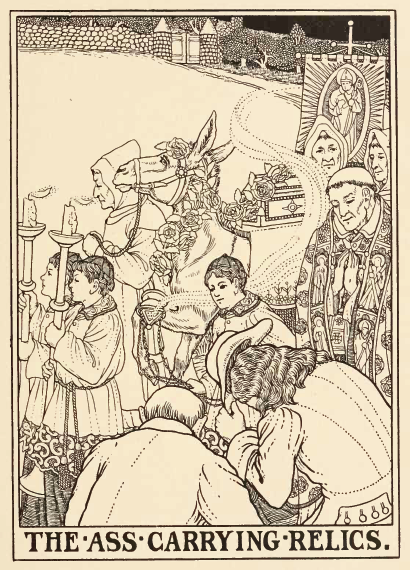ὁράω ~ ὄψομαι ~ εἶδον: see, look at
κινέω ~ κινήσω ~ ἐκίνησα: set in motion, move
καθεύδω ~ καθευδήσω ~ ἐκαθεύδησα: sleep
διδάσκω ~ διδάξω~ ἐδίδαξα: teach, instruct
πλέω ~ πλεύσομαι~ ἔπλευσα: sail, swim, float
These are the proverbs (and there are always more proverbs at the blog):
Μὴ κίνει Καμάριναν.
Ἐξ ἑνὸς πάνθ᾽ ὁρᾷν.
Ἅλας ἄγων καθεύδεις.
Ἰχθὺν νήχεσθαι διδάσκεις.
Σίδηρον πλεῖν διδάσκεις.
And now, some commentary:
Μὴ κίνει Καμάριναν.
Don't move Kamarina.
This refers to a marshy swamp outside the city of Kamarina in Sicily. Because the air of the swamp was unhealthy, the people wanted to drain the swamp, but the Delphic oracle told them: Μὴ κίνει Καμάριναν. The people ignored the oracle, drained the swamp, and thus exposed their city to attack by their enemies. The saying of the oracle came to be used like a proverb, and as such it is the subject of a poem in the Greek Anthology.
Ἐξ ἑνὸς πάνθ᾽ ὁρᾷν.
To see all things from the one.
The saying appears in the sayings collected by Apostolius. The word πάντα, "all (things)," drops its final vowel before the following vowel, and the rough breathing causes the aspiration: πάνθ᾽ ὁρᾶν. Compare the opposite idea expressed in the U.S. motto: E pluribus unum, "Out of the many, one."
Ἅλας ἄγων καθεύδεις.
You are sleeping while carrying salt.
As Erasmus explains, the proverb refers to someone who is behaving carelessly while carrying out a difficult task, as salt was a valuable commodity that could be easily damaged by being spilled, coming into contact with water, etc. Specifically, Zenobius says, "A merchant, having filled his vessel with salt, fell asleep. It happened that the water in the bilge increased and dissolved the salt. Hence the proverb." The Greek word for salt, ἅλς, is cognate with English "salt," Latin sal, etc.
Ἰχθὺν νήχεσθαι διδάσκεις.
You're teaching a fish to swim.
This is a proverbial fool's errand: fish know how to swim already; you don't have to teach them. Compare a similar saying: Ἀετὸν ἵπτασθαι διδάσκεις, "You're teaching an eagle to fly." From the root in the verb διδάσκω, we get English words like didactic, autodidact, etc.
Σίδηρον πλεῖν διδάσκεις.
You're teaching iron to float.
This is another kind of fool's errand, the opposite of the previous proverb: iron is never going to float. At least, that's what the Greeks thought about iron. Later on, of course, iron did learn to float! You can read about the history of iron-hulled sailing ships at Wikipedia.
And here's a random proverb too:



.jpg)
.jpg)







.jpg)